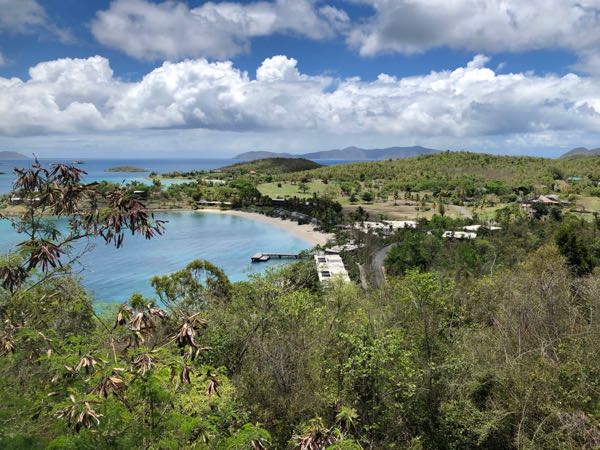
Caneel Bay was “grossly underinsured” when Hurricane Irma hit, the resort’s insurer wrote in court documents filed earlier this year. The documents shed some more light on what may be happening behind the scenes at Caneel Bay. As you likely have read here on News of St. John, the property has sat in shambles since September 6, 2017, the day Hurricane Irma hit St. John.
According to the documents, CBI Acquisitions chose to obtain property and business interruption insurance for a total limit of $32 million per occurrence. This was “despite its own determination that the total insurable value was $65,413,068,” its insurer wrote in court documents. “Thus, the Caneel Bay Properties were grossly underinsured,” the insurer continued.
Caneel collected $32 million from damages sustained during Hurricane Irma. It filed a separate claim for $32 million following Hurricane Maria. The insurer denied that claim stating:
“Based on the evidence available, there is no additional damage caused by Hurricane Maria that was not considered in the scope of damages from Hurricane Irma. Specifically, the Report concludes “that there is no additional scope required to address the effects of Maria on the subject property that is not already included in the repairs required to address the effects of Irma. Thus, at this time, Insurers have not identified any damages covered under the Policy from Hurricane Maria.”
There is a clause in the insurance documents that states the two parties can go to arbitration if an agreement cannot be made with regard to claims. When the two sides could not agree on an arbitrator or umpire, the insurers filed a lawsuit.
“This lawsuit arises out of an insurance coverage dispute. Caneel Bay Resort and surrounding properties on St. John, U.S. Virgin Islands, owned by CBIA, suffered significant damage from Hurricane Irma,” the lawsuit reads. “CBIA and the Insurers (the “Parties”) resolved the Hurricane Irma claim with the Insurers paying out the $32 million limit of coverage. CBIA, however, contends that it suffered a separate $32 million loss as a result of Hurricane Maria. As the Parties could not agree as to the scope of covered damages arising from Hurricane Maria, if any, the subject insurance policies’ arbitration provision was invoked by CBIA. The election of arbitration triggered a requirement that each party appoint a “competent and disinterested” arbitrator and then the party-appointed arbitrators were to appoint a neutral umpire.”
It is unclear whether an arbitrator and umpire was agreed upon or whether CBI Acquisitions received an insurance payout stemming from Hurricane Maria, as the lawsuit was voluntarily dismissed one month after its filing.
CBI Acquisitions has publicly stated that it will cost an estimated $100 million to rebuild Caneel Bay. Last spring, they asked the federal government for a $70 million payout in exchange for them walking away and handing the resort back to the National Park Service prior to the expiration of their Retained Use Estate agreement. That agreement expires in late 2023. If they do not receive the payout, CBI Acquisitions could very well hold onto the property and leave it as is for the next four years. It does not appear that they are required to repair any of the damages sustained during Hurricane Irma prior to the end of their leasehold.
CBI Acquisitions is also being sued by Bluewater Construction, Inc., a company hired to renovate several units at Caneel Bay prior to the 2017 hurricanes. This is a completely separate lawsuit and is not related to insurance coverage or the hurricanes. According to court documents, CBI Acquisitions owes Bluewater Construction, Inc. $214,416.55 for breach of contract, and breach of duty of good faith & fair dealing. That lawsuit is ongoing.
We reached out to CBI Acquisitions and Bluewater Construction, Inc. for comment. We received read receipts from both, however neither have responded.


Has the Island Blues site been cleared?
after all jen wrote and you ask that?
Let it go until 2023 and someone else can come in and pay their fair share back to the island. CBI never/nor still cares about anything but their own pocket.
We are on the island right now and as sad as it makes my family to see the property in this condition, I agree. CIBA’s request for cash and a release from environmental liability is disgusting. The DOI should let let it go until 2023.
Are you able to tell us which insurance company insured Caneel?
We just got back from the island and I have to say it’s really sad to see the state of the caneel bay property. So much hard work has gone into rebuilding the island since those two hurricanes in this piece of beautiful property is gone completely ignored. Shame on CBI acquisitions. Not only is it an eyesore but the lack of a functioning Resort is impinging on the tourist trade which the locals depend upon for income as well as employment.
Where did the $32M payout from insurance go?
THIS is a great question. This is so very sad.
It think the issue is that it will cost $100 million to rebuild and they were only insured for $32 million, so they do not want to spend the $32 million if it is not going to get them over the finish line.
CBI has the right to keep that insurance money, they are under no obligation to fix the damage.
The NPS should have done a better job writing the lease/retained use/concession agreement. Let us hope they learned their lesson.
Maybe the guy that took over the Cinnamon concession will be interest in Caneel after the CBI term expires? It’s going to take major dollars for any time of rehab/reopenning.
The difference between Caneel and the other NPS properties is those lodges out west are existing and on going business enterprises. Companies that bid on those concessions are buying the right to take over an existing, operating property for a set period of time, leases/agreements come up for public bid every X number of years.
No investor is going to sign up to invest $50-$100 million for a 10 year term. Or a the remainder of the CBI agreement.
The NPS needs to:
commit to a long term agreement that entices an investor to make massive capital Improvements in exchange for a term that allows them to recoup investment.
Cleanup the site, rebuild and then lease it an operator for a shorter term (highly unlikely, the federal government isn’t in the business it develop resorts)
Or
Clean up the site and open it up as NPS beaches and up the existing budget to maintain the paths, provide trash removal, Ranger services, maintain the dingy dock/collect mooring fees, etc.
I would be very interested in the local, long term Islander thoughts on this. As tourists, we are selfish and we want STJ to be what we, a once, twice a year visitor wants.
What is best for the island?
A Caneel type of resort with high Hotel tax revenue and 200 jobs?
A campground with a handful of low wage jobs and less tax revenue?
A return to just beaches and federal wages for a few NPS employees?
Jen – this would make for an interesting investigation.
Lots of great questions… I know my thoughts, but I am curious what others say.
While I agree with most of what you’ve said, the design of the RUE isn’t on the NPS. The RUE is the original agreement between the grantor and the NPS. They were not about to bind themselves to do anything and they were going to get whatever terms they wanted. They were, after all, donating thousands of acres of parkland and an operating resort.
I’m also a once a year tourist and have been for 15 years- St. John is my favorite spot on earth. It’s my understanding that the local economy is probably 90% supported by tourism. I know some islanders push back on development, but for St. John to continue to exist for anyone, tourism has to be of paramount concern. With this in mind, it seems to me that the best option for St. John (and all who live there and visit there) is to capitalize on a full development of Caneel Bay. This would mean a high end hotel, restaurant, shops, etc.—-in other words a luxury resort. The results would bring maximum dollars to the island, and this would also create the most possible jobs.
When the overall economy is strong, all people involved will benefit.
“CBI” needs to be divested of the property and sued for the damages incurred. “CBI” is representative of all that is corrupt and disgusting about their business model, that we all let wash because it “makes money”. Real people lost their jobs because of “CBU” and the economy of St John/USVIs/BVIs has suffered horribly from their negligence.
I’ve said this before. There is no way CBI should be paid a penny to walk away. Conversely, they should be sued for not repairing, maintaining and running Caneel as a resort. I’m not familiar with the lease and it’s possible the legal language is not specific on this point, however, the contract surely implies that CBI is responsible for running and maintaining a resort on the property. Why else would they have leased the land? The USVI must be aggressive legally to kick them out ASAP, as well as sue for damages for not maintaining
the property. It seems to me that’s standard in any property lease.
I’m for anything except paying the crooks to walk away.
I worked at Caneel for 5 years in the early 90s. I remember the grounds manager, Raymond, spraying massive amounts of chemicals all over the place to control bugs and whatever else. I once asked him why he never used a mask when he dispensed all those chemicals and he smirked at me and said it was all ok. He died from them maybe 10 years later. That place is very polluted now. What a shame. Its such a special place.